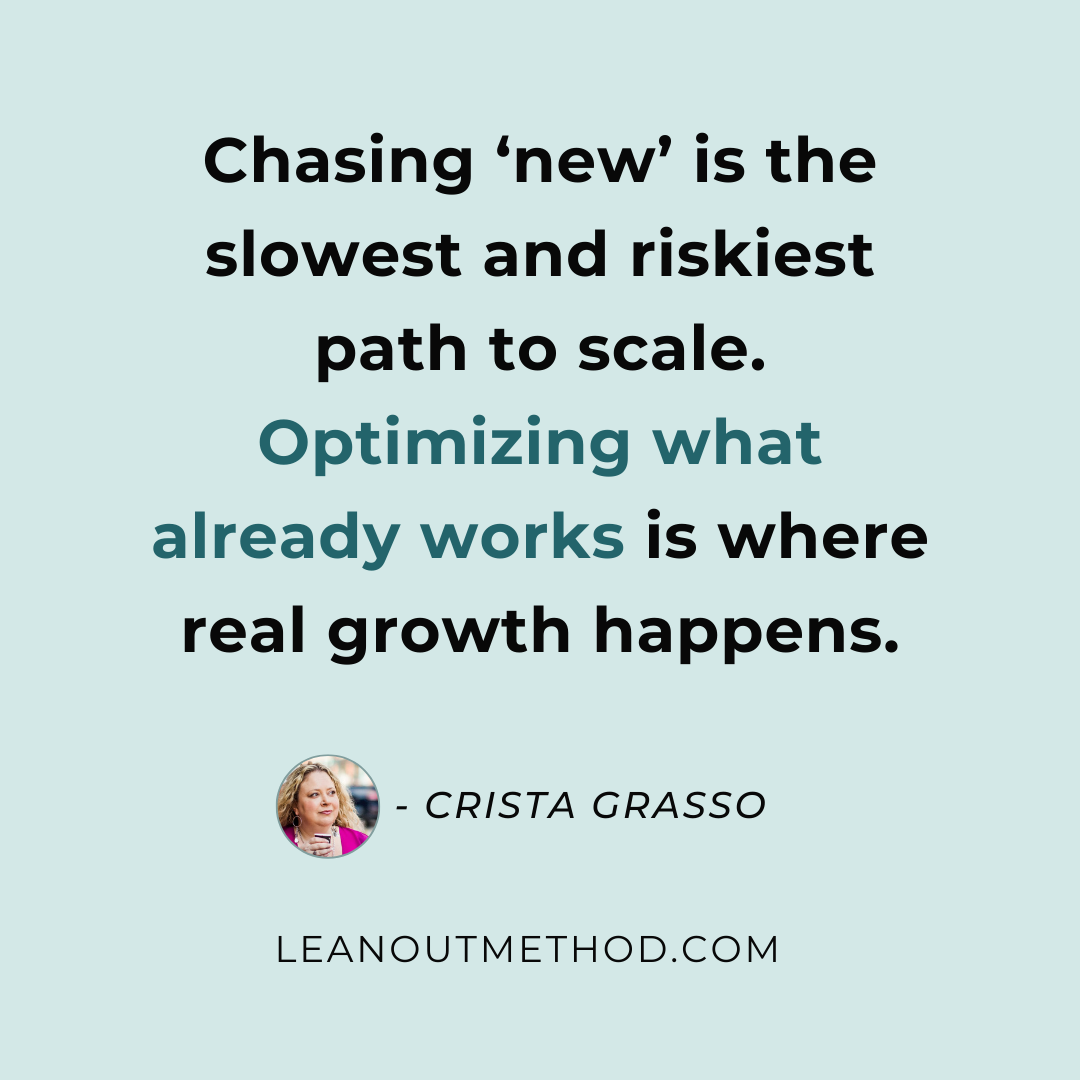
What are some strategies businesses can implement to minimise the time spent searching for information?
How can visionary leaders balance their innovative ideas with the need for implementation and maintaining focus on current projects?
If you’re like most small business owners right now, you're likely looking for ways to generate more revenue, bring in new clients, and gain traction in what’s proving to be an interesting year.
But here’s a hard truth that most entrepreneurs overlook.
You’re probably leaking profit and wasting valuable time in ways you don’t even realize, and it all comes down to one thing: operational inefficiency.
At Lean Out Method, we teach business owners how to identify and eliminate waste.
This isn’t just a concept borrowed from manufacturing or software development.
We’ve developed a version of the 10 Areas of Waste specifically for smaller, service-based businesses, especially those with a digital presence, andnd it applies no matter the size or scale of your business.
The 10 Areas of Waste are unpacked below and are also discussed in episode 213 of the Lean Out Your Business Podcast, where in this episode I am joined by Jessica D. Maine.
Tune into Episode 213 of the Lean Out Your Business Podcast or keep reading below.
Unnecessary Complexity
This is the most common and often the most overlooked. Complexity sneaks in as your business grows.
New tools, team changes, fresh ideas, and shifting offers all contribute to it.
Even in my own lean business, we constantly ask: how can we make this simpler?
What’s streamlined today becomes complicated tomorrow without regular refinement.
Simplicity is not a one-time achievement. It requires continuous attention.
Unneeded Work and Incomplete Work
These often show up together.
Unneeded work is when you build something nobody uses or maintain a tool that's redundant.
Incomplete work comes from too many started-but-never-finished projects.
These usually stem from visionary founders chasing ideas without fully following through.
Both forms of waste drain time and resources.
New vs. Optimization
Chasing "new" is tempting.
It’s exciting, but it’s also the slowest and riskiest path to scale.
Instead, businesses should focus on optimizing what already works.
A successful business often feels a little boring, but that stability is where real scalability happens.

Searching
It may sound minor, but searching is a major time thief.
How often do you or your team ask, “Where is that document?” or “Which version is correct?” Those minutes add up quickly.
Worse, the interruptions derail focus and momentum.
Without a system for organizing digital assets, your business is likely bleeding hours every week.
Poor Quality
Poor quality isn't always obvious.
It can be broken links on your website, outdated materials, or sloppy deliverables.
Often, it stems from burnout or rushing through tasks.
Quality suffers when you’re stretched too thin or juggling too much at once.
Even a simple habit like clicking every link in an email before hitting send can prevent costly mistakes.
Underutilized Resources
This includes people, tools, time, and money.
Are your team members working in their zones of genius?
Are you paying for software you don’t use?
Are you ignoring time-saving automation already built into your tools?
Optimizing how you use your resources often leads to quick wins.
Knowledge Depreciation
Training someone months before they apply that knowledge is ineffective.
Course content that isn’t regularly updated loses value.
If you create a beautiful onboarding process, but your team forgets everything before using it, you’ve wasted time and effort.
Knowledge must be delivered just in time to be useful.
Content should be reviewed and refreshed regularly.
Delays
Delays are costly, even when they seem small.
Launching a program three months late may not feel like a big deal, but that’s three months of lost revenue, missed referrals, and slower client momentum.
Delays also affect how your brand is perceived.
Consistency builds trust.
Lack of Operational Identity
This final one is rarely discussed but deeply personal.
Once you’ve built a business that runs without you, it can feel strange.
Many founders feel uncertain or even irrelevant.
You wanted freedom, but now you’re unsure what your role should be.
This is an identity shift.
It’s about redefining what a rich, fulfilling life means now that your business no longer depends on you every day.
So, Where Do You Start?
If you feel overwhelmed by inefficiencies or stuck in the day-to-day, start by identifying your biggest areas of waste.
Grab our free Waste Elimination Guide to pinpoint what's holding your business back.
You’ll also find practical steps to start improving right away.
If you're ready to step fully into visionary leadership, take a look at Ops Alchemy, and if you're passionate about helping other businesses do the same, explore our CSOO Certification.
Operational efficiency leads to sustainable growth, increased profit, and the freedom you started your business for.
Now’s the time to lean out.
by Crista Grasso
Crista Grasso is the go-to strategic planning expert for leading global businesses and online entrepreneurs when they want to scale. Known as the "Business Optimizer", Crista has the ability to quickly cut through noise and focus on optimizing the core things that will make the biggest impact to scale a business simply and sustainably. She specializes in helping businesses gain clarity on the most important things that will drive maximum value for their clients and maximum profits for their business. She is the creator of the Lean Out Method, 90 Day Lean Out Planner, and host of the Lean Out Your Business Podcast.




